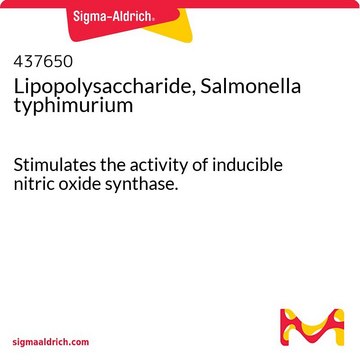SMB00610
Lipopolysaccharide from Porphyromonas gingivalis
purified by phenol extraction
Sinonimo/i:
LPS
Autenticatiper visualizzare i prezzi riservati alla tua organizzazione & contrattuali
About This Item
Codice UNSPSC:
12352211
Prodotti consigliati
Origine biologica
Porphyromonas gingivalis
Livello qualitativo
Forma fisica
powder
Purificato mediante
phenol extraction
Impurezze
≤3% Protein (Lowry)
Colore
white to faint yellow
Solubilità
triethylene glycol dimethyl ether: 0.90-1.10 mg/mL to hazy, colorless to light yellow
Condizioni di spedizione
ambient
Temperatura di conservazione
2-8°C
Categorie correlate
Descrizione generale
Lipopolysaccharides (LPSs) are characteristic components of the cell wall of Gram-negative bacteria like Porphyromonas gingivalis. It differs from LPS from Escherichia coli in its structure and various functional activities.
Applicazioni
Lipopolysaccharide has been used:
- as a treatment to stimulate acute lung injury in human bronchial epithelial (HBE) cells
- as an agonist for toll-like receptor 4 (TLR4) and to stimulate intestinal normal fibroblasts (NFs) to study osteopontin (OPN) expression in myofibroblasts
- to study its effects on pro-inflammatory and pro-coagulant genes expression in endothelial cells
Azioni biochim/fisiol
LPS and its lipid A moiety stimulate cells of the innate immune system by the Toll-like receptor 4 (TLR4), a member of the Toll-like receptor protein family, which recognizes common pathogen-associated molecular patterns (PAMPs).
Additionally, it was demonstrated that the mechanisms by which LPS from E. coli and P. gingivalis modulate cluster of differentiation 14 (CD14), toll-like receptor 2 (TLR2), and toll-like receptor 4 (TLR4) surface expression, primary and secondary cytokine responses are different.
Porphyromonas gingivalis is a Gram-negative bacterium that is known to be involved in adult periodontitis. Periodontitis is a chronic inflammatory disease characterized by the recession of the supportive tissue surrounding teeth. Studies have shown that the LPS from P. gingivalis plays an important role in this disease.
A recent study demonstrated that LPS from P. gingivalis stimulates insulin secretion by the pancreatic β cell line, MIN6. In the presence of 5 mM glucose and 50-500 ng/mL LPS from P. gingivalis, a significant induction of insulin secretion was observed.
Additionally, it was demonstrated that the mechanisms by which LPS from E. coli and P. gingivalis modulate cluster of differentiation 14 (CD14), toll-like receptor 2 (TLR2), and toll-like receptor 4 (TLR4) surface expression, primary and secondary cytokine responses are different.
Porphyromonas gingivalis is a Gram-negative bacterium that is known to be involved in adult periodontitis. Periodontitis is a chronic inflammatory disease characterized by the recession of the supportive tissue surrounding teeth. Studies have shown that the LPS from P. gingivalis plays an important role in this disease.
A recent study demonstrated that LPS from P. gingivalis stimulates insulin secretion by the pancreatic β cell line, MIN6. In the presence of 5 mM glucose and 50-500 ng/mL LPS from P. gingivalis, a significant induction of insulin secretion was observed.
Nota sulla preparazione
LPS from P. gingivalis is soluble in water and cell culture medium DMEM (1-5 mg/mL), yielding a clear solution.
Altre note
To gain a comprehensive understanding of our extensive range of Lipopolysaccharides for your research, we encourage you to visit our Carbohydrates Category page.
Codice della classe di stoccaggio
11 - Combustible Solids
Classe di pericolosità dell'acqua (WGK)
WGK 3
Punto d’infiammabilità (°F)
Not applicable
Punto d’infiammabilità (°C)
Not applicable
Certificati d'analisi (COA)
Cerca il Certificati d'analisi (COA) digitando il numero di lotto/batch corrispondente. I numeri di lotto o di batch sono stampati sull'etichetta dei prodotti dopo la parola ‘Lotto’ o ‘Batch’.
Possiedi già questo prodotto?
I documenti relativi ai prodotti acquistati recentemente sono disponibili nell’Archivio dei documenti.
I clienti hanno visto anche
H E Barksby et al.
Clinical and experimental immunology, 156(3), 479-487 (2009-05-15)
Porphyromonas gingivalis lipopolysaccharide (LPS) (strain W50) interacts with Toll-like receptor 2 (TLR-2) leading to cytokine expression and inflammation, and thereby plays a key role in the pathogenesis of periodontal disease. The aims of this study were to investigate gene expression
Analysis of Lipopolysaccharides of Gram-Negative Bacteria
Mayer, H. et al.
Methods in Microbiology, 18, 157-207 (1985)
Differential expression of immunoregulatory genes in monocytes in response to Porphyromonas gingivalis and Escherichia coli lipopolysaccharide.
Barksby, H.E, et al.
Clinical and Experimental Immunology, 156, 479-487 (2009)
Virulence factors of Porphyromonas gingivalis.
Holt, S.C., et al.
Periodontology 2000, 20, 168-238 (1999)
Epidemiology of subgingival bacterial pathogens in periodontal disease.
Zambon, J.J., et al.
Molecular Pathogenesis of Periodontal Disease, 1-12 (1994)
Il team dei nostri ricercatori vanta grande esperienza in tutte le aree della ricerca quali Life Science, scienza dei materiali, sintesi chimica, cromatografia, discipline analitiche, ecc..
Contatta l'Assistenza Tecnica.



